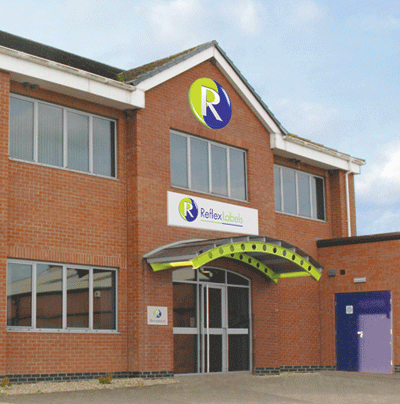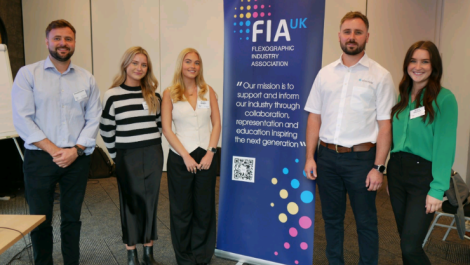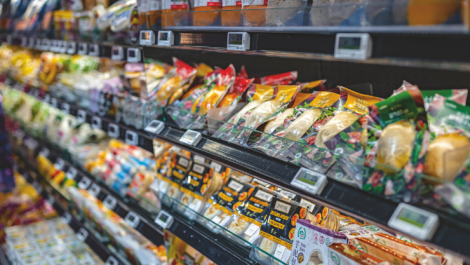Reflex Boston lies in the heartland of the labelling and packaging printing community of East Anglia
In keeping with its slogan, ‘The sustainable packaging company’, Reflex was recently awarded gold status by The Green Organisation. The labels and flexibles company is celebrating its 10th anniversary this year and Neel Madsen paid its Boston facility a visit.
At the FINAT Technical Seminar in February, labels and flexible packaging printer, Reflex, impressed the audience both by its openness about its business but also by its firm commitment to sustainability and by its green credentials.
A quick look at the company website reinforces this impression: doing business in the most environmentally friendly way is obviously top of the agenda and something it is very passionate about. A ‘green hero’ blog gives out advice on how to save water during drought and lists a number of pledges which include not only what the company will do, such as ‘continue to seek out the best, brightest and most effective ways to reduce the carbon foot print of our company and our customers’, but even goes as far as to suggest ways the team can continue the green philosophy at home by avoiding the use of weed killers in their gardens.
Will Parker, who joined the company two years ago and is part of the senior management team, said, ‘Sustainability is a huge issue and the message is getting out there. Just look at how labels now carry sustainability logos that are the same size as the brand logos.’ Jessica Henderson, who is in charge of marketing development throughout the group, agreed, ‘The end users demand sustainable products and brand owners are responding to this demand.’
Growing fast
Reflex has come a long way since managing director, Ian Kendall, acquired Easedale Labels in Sherburn, near Leeds, in 2002 with three co-directors. It has seen rapid expansion mainly through acquisition and now comprises six BRC certified manufacturing sites across the UK. Privately owned, its turnover this year is estimated at £50 million and the total number of employees exceeds 300.
Today, it builds its business structure on three main pillars: labels, packaging and repro services, and has sites in Newcastle, Mansfield, Leeds, Leicester, Telford and Boston.
In 2010, Reflex made its move into flexible packaging with the purchase of Cropak, in Telford. Having started out as a label printing company, the management team saw no reason why the successful green recipe couldn’t be transferred to packaging and set about finding a suitable candidate for this new venture. With its ‘have a go’ attitude, it has now transformed the packaging company and added another bow to its string.
In 2011, the company founded a dedicated shrink sleeve division, Reflex Dynamic Sleeves (RDS), which works closely with the Greenhouse Studio, one of the company owned reprographics and artwork suppliers. RDS also makes use of the company’s Innovation Centre – an initiative set up to focus on better packaging and improved shelf appeal. Another service provided offers customers help with reducing waste and buying packaging in the most efficient way.
Green printing
The company has brought all its environmental initiatives and products together under one banner, Reflex Eco Dynamics, which is used to certify that labels have been produced in a factory that uses carbon neutral electricity and are made from 100% recycled materials. All waste has been recycled since 2008.
Being green also means investing in the latest technology and equipment. The Mansfield site has its own wind turbine and has just had all its presses upgraded to the latest UV curing system from GEW, an industry first, which will reduce running costs and lower energy consumption.
The Telford site runs a bio cleaner which removes harmful emissions without burning gas, while its latest gearless presses recycle the heated air reducing energy consumption. The company has also made substantial investment in linerless technology and set up a dedicated plant at its Newcastle site. Linerless offers a solution to the problem of release liner waste and promises greater application speeds, faster set up and more labels per roll.
On the Fens
As you drive along the A17 near Boston, in Lincolnshire, the big blue and green Reflex ‘R’ shines like a beacon across the flat fenland. The group bought Superior Labels in 2009, and today employs 65 people on what is the largest of its sites by area.
After acquiring the already well-established business, it quickly became apparent that some major reorganisation was needed in order to implement the company philosophy successfully and get the operation running smoothly. Mr Parker said, ‘At first, we let the incumbent management continue and assumed that they would come on board automatically, but that was not the case. We then went in and turned the whole site upside down, and today, not a single piece of machinery or desk is in the same place it was before.’
The line of Gidue presses that were included in the deal are still running strong producing labels for many major retailers and supermarket in the UK, Europe and the US. They are complemented by finishing equipment from AB Graphic, Prati and Bar Graphic. Lean management principles were employed in the reorganisation process of the plant. This streamlining now has the presses and finishing equipment lined up facing each other, the shop floor is tidy with everything in its place, stock is only kept for current orders and colour-coding is used throughout the warehouse for easy accessibility and identification. Simple solutions that make all the difference in the running of a busy printing company. Along with heavy investment in new equipment and training, the result is that output has gone up by 30% and the business is now stable and growing.
The operation at Boston is run by Sharon Preston and Tanya Needham, who both stayed on after the takeover. Mrs Preston said, ‘The way the business functions now is completely different to how it was before. We are much more efficient now. Being part of a group of companies gives customers the security of knowing that we have contingency in the form of other sites if needed. For many of our biggest customers that is a now requirement and it gives us the opportunity to get work we simply wouldn’t have been offered before.’
Have faith in your staff
The company puts a lot of emphasis on staff training and communication within the company. At Boston, a new training room has been installed where staff are educated and kept fully informed of how the site is performing and what the goals are. The walls are covered in flow charts and mind maps, not what you would expect to find at your typical label printer.
Mr Parker said, ‘The biggest problem we’ve got in the industry is the de-skilling of it. Everyone has become a driver, but nobody knows how to fix the engine. The lack of training is a scandal.’ He continued, ‘You’ve got to have faith in your staff. We don’t just invest in the business; we invest heavily in the people, because we need them to enjoy their job and understand what they are doing in an environment that is engaging and fun.’
Constant gardeners
The Systems Division is also based at Boston. Run by Nigel Wilson and the team, it provides a service that encompasses barcode systems, plain labels and ribbons, software, printer servicing and label applicator machinery.
The team of engineers spend most of their time on the road, servicing, training and installing the machinery which plays a crucial role in the supply chain. A simple printing error on a barcode will cause the entire shipment to go to seed, either rejected, fined or both. When label applicators go down, productivity suffers severe damage.
In keeping with the Reflex business model, the machinery is environmentally sound and the company is one of the top resellers of Toshiba barcode equipment. Toshiba recently went carbon neutral for all its printers, and old Toshiba printers can have their carbon offset retrospectively via the Carbon Zero Scheme.
Green marmite
As a company, Reflex comes across as dedicated and sincere, but also somewhat quirky, and this quirkiness is reflected in the general reluctance to use job titles and its unconventional approach to management. Mr Parker concluded, ‘We are a bit like green marmite. You either love us or hate us. Our strength lies in the people we employ. We are all multi-skilled and passionate about what we do and we don’t need a label to pigeonhole us.’
Quirkiness aside, the company impresses with its environmentally aware business model and its determination to convince the rest of the world that ‘green’ is the way to go. But as it also seems to be making a ‘decent’ profit at the same time, it would appear that it may be a trail blazer for what will eventually become standard practice in the industry.






